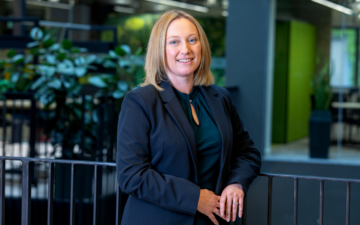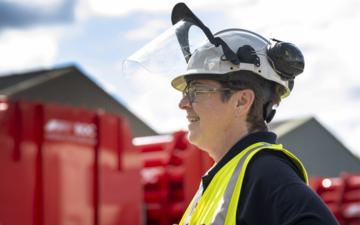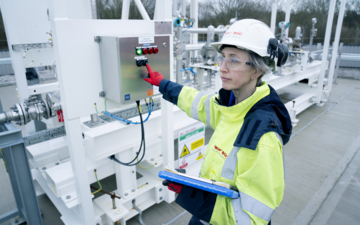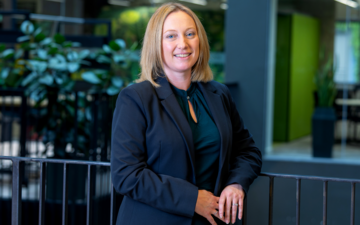- Official BOC UK Online | Industrial Gases | Products & Solutions | BOConline UK
-
Shop
- Industries
- Processes
- Gases & Equipment
-
Solutions
-
Services
-
Health & Safety
-
Contact & Support
- What's Happening
-
Net Zero Strategies
BOC Hydrogen People: Meet Caroline Smither, Director of Discipline Engineering
Posted by BOC

Welcome to BOC’s ‘Hydrogen People’ blog series. In each edition, we tell the story of a team member who plays a vital role in driving our organisation’s hydrogen journey. From production to storage to transportation, every step of the hydrogen value chain is delivered by specialist experts who understand how to help our clients adopt hydrogen as a replacement for fossil fuels.
Caroline Smither is BOC’s Director of Discipline Engineering. As one of BOC’s most senior process safety experts with a wealth of hydrogen experience, Caroline is responsible for the strategic management of all of BOC discipline engineering functions. Previously, as Process Safety Team Leader, responsible for safety across all BOC production sites and risk assessment, Caroline worked with regulatory bodies, such as the HSE, to help determine gaps and influence safe and effective regulation for the sector.
She explains, however, that regulation can only go so far: It’s likely that hydrogen regulation will change as the sector develops, but we’re future proofing our designs – we’re documenting what we’re doing and being rigorous, so that we’re prepared for any upcoming changes in regulation.
"We’re protecting future business by evaluating risks, understanding their extent and documenting how we are managing them."
The opposite of a Minimum Viable Product
A “minimum viable product” or “MVP” may be popular in some organisations, but Caroline and BOC take the polar opposite approach when designing a site to produce hydrogen.
BOC has substantial experience of lower and upper tier COMAH (Control of Major Accidents Hazards) sites, and the level of rigour needed to demonstrate risk management and to satisfy the HSE. The BOC standard Engineering Processes are built on this principal and the same approach is applied to all sites.
A Team of Experts
In 2021, Caroline set up a working group of BOC hydrogen experts with two aims:
1) to formalise a set of hydrogen specific safety standards and frameworks, and
2) to provide our project engineers, with more consistent and timely technical support to define project scope.
This working group was soon upgraded to an official ToE, or ‘Team of Experts’. This is a long-established concept at BOC, and it allows for people’s time to be officially budgeted to attend these meetings: a mark of BOC’s commitment and willingness to invest in hydrogen safety.
The ToE is now an integral part of the constant innovation and improvement to the way BOC produces, stores and transports hydrogen.
Seeing the big picture
Caroline has been working in hydrogen process, operations and safety for 20 years, and has spent the last seven of those years at BOC. She was the process safety lead during Covid, which presented many unique challenges, but this is exactly what Caroline loves about her work: “I’m a problem solver”, she says. “With hydrogen, it can feel like we’re reinventing the wheel, but we aren’t, hydrogen has been used safely in industrial settings for many years. I think of it as starting with a wooden wheel from a cart, we need to develop and extend the way we use hydrogen, iterating the designs over and over, learning and improving, until it’s a tyre on a Formula One car. Transitioning from industrial application to making hydrogen accessible to the public safely, is a huge challenge. That’s why a rigorous approach to safety is so important: we’re breaking new ground all the time.”
As a self-described “office engineer”, Caroline looks at the big picture, putting the processes in place to ensure the safe running of BOC’s hydrogen projects. As such, she interacts with a wide range of experts across the operations, engineering and project teams, and is privy to their ideas and observations, as well as their suggestions for how to improve.
The importance of expertise
Caroline’s work with regulatory bodies and hydrogen experts at BOC has reinforced her belief that there is a direct link between an organisation’s accumulated knowledge, and the extent to which they can be trusted to handle hydrogen safely.
That’s why she urges caution to anyone listening to the claims of unproven companies dealing in hydrogen: “They offer everything you could possibly want, but they don’t always know how to deliver it safely.”
Caroline explains that hydrogen needs to be managed by people who know and understand it inside-out: “There's a big educational curve that starts with the industry and regulators and then on to businesses and consumers.”



